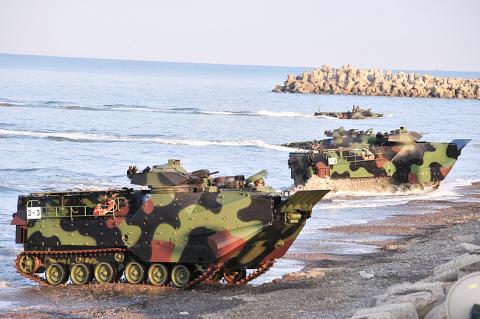Deliveries of US amphibious assault vehicles have been delayed, with supplier the US military citing technical difficulties.
In a bid to improve the nation’s amphibious assault capabilities, 36 AAV-7A1s were purchased from the US, with the first shipment to arrive in the second half of this year and the remainder to be received by the end of 2019.
Sources said that even though payment for the first shipment has been sent, the vehicles are to be delayed until 2020.

Photo: Tsai Tsung-hsien, Taipei Times
One source said the military has been in contact with the US in an attempt to resolve the situation, expressing concern that LVTP-5 amphibious vehicles in service have exceeded their useful life and that continued use would compromise Taiwan’s amphibious assault capabilities, but the US has remained resolute in its position.
The US cited technical difficulties for the delay, saying that it is waiting on other orders.
Military officials said they had settled the issue with the US in 2013, adding that the delay might be because of a political issue.
“The AAV-7A1 plays a pivotal role in modern amphibious warfare. Whether in defense of the perimeter of the Pratas Islands [Dongsha Islands, 東沙群島] or Itu Aba Island [Taiping Island, 太平島], in a mission to safeguard Taiwan’s southern coast or the outlying islands of Kinmen and Matsu, or even in conducting rescue missions following major natural disasters, the AAV-7A1 plays a crucial role,” the source said.
“Delaying shipment of the 36 vehicles will be a major blow to the military’s ability to maintain combat readiness,” the source said.
Navy Command Headquarters yesterday said that “because the US has to conform to a production schedule that allows it to complete several orders simultaneously, shipments will be postponed.”
The navy said that the shipment would be accomplished in two installments, with 24 units arriving in 2020 and the remainder in 2021, adding that it would make amendments to its investment network because of the delay.
The navy has used the LVTP-5 in amphibious landing exercises, but as the vehicles are beyond their service lifespan, finding replacement parts has become increasingly difficult.
In 2006, the navy commissioned the US to produce 54 AAV-7A1s to replace its outdated fleet.
A military official said that although it has already procured 54 AAV-7A1s, that is far from its target, which is to procure 36 more.
The navy plans to use four of the AAV-7A1s as command vehicles, while two are to be assigned for use in disaster relief operations.
The official said the 36 vehicles cost NT$5.3 billion (US$165.26 million), with the purchase contract signed by both sides on May 12 and funds transferred on June 24.
“It was completely unexpected that the US would suddenly announce a three-and-a-half-year delay. The sudden, unexpected nature of the decision was a great shock to the military — we are unable to accept this turn of events,” the official said.

The CIA has a message for Chinese government officials worried about their place in Chinese President Xi Jinping’s (習近平) government: Come work with us. The agency released two Mandarin-language videos on social media on Thursday inviting disgruntled officials to contact the CIA. The recruitment videos posted on YouTube and X racked up more than 5 million views combined in their first day. The outreach comes as CIA Director John Ratcliffe has vowed to boost the agency’s use of intelligence from human sources and its focus on China, which has recently targeted US officials with its own espionage operations. The videos are “aimed at

STEADFAST FRIEND: The bills encourage increased Taiwan-US engagement and address China’s distortion of UN Resolution 2758 to isolate Taiwan internationally The Presidential Office yesterday thanked the US House of Representatives for unanimously passing two Taiwan-related bills highlighting its solid support for Taiwan’s democracy and global participation, and for deepening bilateral relations. One of the bills, the Taiwan Assurance Implementation Act, requires the US Department of State to periodically review its guidelines for engagement with Taiwan, and report to the US Congress on the guidelines and plans to lift self-imposed limitations on US-Taiwan engagement. The other bill is the Taiwan International Solidarity Act, which clarifies that UN Resolution 2758 does not address the issue of the representation of Taiwan or its people in

US Indo-Pacific Commander Admiral Samuel Paparo on Friday expressed concern over the rate at which China is diversifying its military exercises, the Financial Times (FT) reported on Saturday. “The rates of change on the depth and breadth of their exercises is the one non-linear effect that I’ve seen in the last year that wakes me up at night or keeps me up at night,” Paparo was quoted by FT as saying while attending the annual Sedona Forum at the McCain Institute in Arizona. Paparo also expressed concern over the speed with which China was expanding its military. While the US

SHIFT: Taiwan’s better-than-expected first-quarter GDP and signs of weakness in the US have driven global capital back to emerging markets, the central bank head said The central bank yesterday blamed market speculation for the steep rise in the local currency, and urged exporters and financial institutions to stay calm and stop panic sell-offs to avoid hurting their own profitability. The nation’s top monetary policymaker said that it would step in, if necessary, to maintain order and stability in the foreign exchange market. The remarks came as the NT dollar yesterday closed up NT$0.919 to NT$30.145 against the US dollar in Taipei trading, after rising as high as NT$29.59 in intraday trading. The local currency has surged 5.85 percent against the greenback over the past two sessions, central